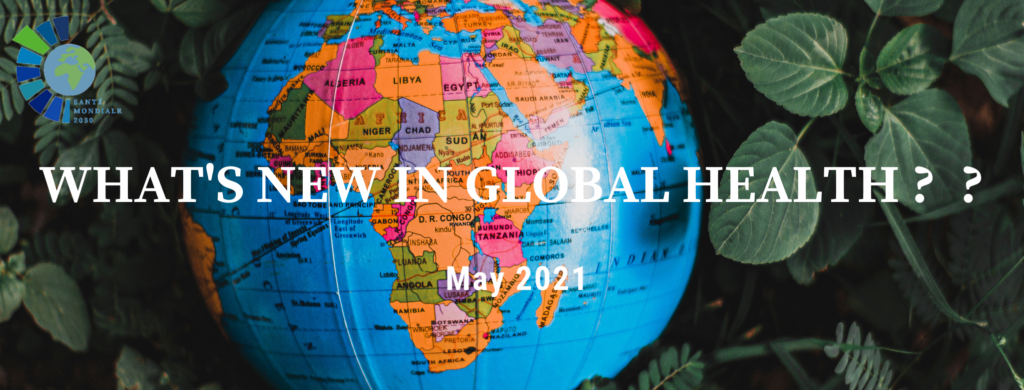Dear all,
Please discover our monthly press review on global health here : https://www.scoop.it/topic/sante-mondiale.
In this month of World Africa Day (May 25), we offer a round-up of African news related to the Covid-19 pandemic.
Data on Covid-19 is lacking on the continent. We know too little about about how the epidemic is actually affecting Africa. The main reason for this is the very limited means of testing, which are almost non-existent away from the main cities. Difficulties are even more pronounced in terms of sequencing and therefore monitoring of variants, since only a handful of African countries have the required equipment. However, we now know a little more about Covid-19-related mortality south of the Sahara. A recently published study shows that the mortality rate among patients with severe forms of the disease is much higher on the continent (48.2% versus 30% on average on other continents), reflecting the scarcity of intensive care units and related equipment and health products (including oxygen) needed for the management of severe forms.
In the face of initially low mortality figures, the demographics of the continent – half of the population is under 19 years of age – were initially put forward. Recent data show a much more differentiated and strongly evolving situation. While the number of new cases has fallen by 9% continent-wide, there is an increasing number of cases in South Africa and Nigeria. A prevalence survey conducted under the leadership of CDC Africa in seventeen countries of the continent, the results of which are currently only available for five countries, shows that in some areas prevalence is very high (22.9% in the population of Lagos).
These trends should be read in the light of the circulation of several variants south of the Sahara. The “Indian” variant was first detected in Uganda, before being detected in Kenya, South Africa, Botswana, Angola, DRC, Nigeria, Zambia and Zimbabwe. The so-called South African variant, identified in 2020, has since been found in twenty other African countries. In December 2020, another variant was identified in Nigeria, but it is not yet possible to determine its contagiousness. The so-called British variant is also circulating on the continent, where it has been found in twenty countries.
But it is certainly the question of vaccines that is currently dominating the conversations. The United Nations Security Council on May 19 recalled the facts: Africa has received only 2% of all vaccines administered worldwide to date. As a reminder, it is primarily through Covax – one of the three pillars of the Accelerated Access to Vaccines for AIDS-19 (ACT) – that vaccines are made available on the continent. The mechanism favors the AstraZeneca vaccine, which is manufactured in India by the Serum Institute of India. But since February, the continent has faced two new challenges. First, the AstraZeneca vaccine is much less effective against the “South African” variant, as shown by researchers at the KwaZulu-Natal Research Innovation and Sequencing Platform. As soon as these elements were known, the South African government decided to put aside the one million doses of AstraZeneca vaccine already ordered. At the end of March, India announced that it was temporarily suspending its vaccine exports in the midst of an unprecedented wave of Covid-19 outbreaks. The Serum Institute of India, the world’s largest vaccine producer, stopped shipments to Covax. Initially announced for June, the resumption of exports has now been postponed until the end of the year.
The last few weeks have also been marked by announcements of the return of many doses of vaccine, or even their destruction. The DRC has returned 1.3 million AstraZeneca doses to Covax out of the 1.8 million received. To explain these massive returns, most observers point to logistical and infrastructure problems – transport, health system, reaching outlying areas – but also stress the important problem of mistrust of vaccines. This mistrust is heterogeneously distributed on the continent, as shown by a study conducted under the auspices of CDC Africa on the perception of vaccines in 15 countries. Of course, it is important to bear in mind the possible discrepancies between declarations of vaccine hesitancy and behavior, as well as the changing nature of vaccine hesitancy. In some African countries, however, the phenomenon is currently such that expatriate foreigners have easy access to vaccines that health authorities are struggling to sell. This mistrust is also partly fueled by conspiracy rumors that circulate via social networks. In response to this challenge, WHO created Viral Facts Africa in late March 2021, a project that brings together experts in fact-checking and health institutions, with the goal of quickly disproving myths wherever they are spread and in local languages.
However, it would be too simplistic to assume that “correcting” the messages alone will suffice. The question of the source of information, and its legitimacy, is fundamental, and must be adressed. The Ebola epidemics have shown that both authorities and health professionals suffer from a very low level of legitimacy in the eyes of the population. Vaccine hesitancy must be understood as the result of past historical experiences. A research conducted on the rumors of sterilization that accompanied a polio vaccination campaign in Nigeria – and which led to its failure – shows that these rumors are best understood as traces of a collective memory of colonial medical practices. In the present, too, African populations often have good reasons for not giving credit to health care workers. We can mention here the frequent practice of sequestration of patients by health care workers at the end of hospitalization, which can last several weeks and is only lifted when these patients have paid their bills, or an inhospitable culture that is widespread in health services. On the mainland, as elsewhere, a relevant response to the pandemic will therefore require a real consideration of local contexts.
We hope that this selection of press articles, scientific articles and reports will give you a clearer view of global health issues.
Enjoy your reading!

